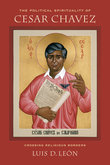by Luis D. León, author of The Political Spirituality of Cesar Chavez: Crossing Religious Borders
As part of National Hispanic Heritage Month, we recognize Hispanic and Latino Americans’ current contributions–and current struggles–in the United States. Learn more at #HispanicHeritage Month.
This post was originally published on November 12th, 2014.
 I grew up in California’s East Bay Area, in San Lorenzo. Even while my family was suburban, and not involved in farm work (my paternal grandmother and grandfather were farm laborers), Cesar Chavez loomed large in my cultural and political ecology. He once spoke at my high school. He seemed to be speaking for us, the Latina/os, at a time when I was aware of only negative and stereotypical media images of brown bodies. When I took a Chicano history course as an undergraduate at UC Berkeley I learned that Chavez was primarily a labor leader. As a doctoral student conducting primary source research in the Chicano archives at UCSB I discovered another Chavez—a distinctly spiritual and religious leader. I knew then that I wanted to uncover and tell that part of his story.
I grew up in California’s East Bay Area, in San Lorenzo. Even while my family was suburban, and not involved in farm work (my paternal grandmother and grandfather were farm laborers), Cesar Chavez loomed large in my cultural and political ecology. He once spoke at my high school. He seemed to be speaking for us, the Latina/os, at a time when I was aware of only negative and stereotypical media images of brown bodies. When I took a Chicano history course as an undergraduate at UC Berkeley I learned that Chavez was primarily a labor leader. As a doctoral student conducting primary source research in the Chicano archives at UCSB I discovered another Chavez—a distinctly spiritual and religious leader. I knew then that I wanted to uncover and tell that part of his story.
My hope is that scholars will discover a different Chavez, one who defies conventional classification, and encounter also a fresh way of narrating his work—one not insistent upon modernist notions of truth and subjectivity. The book is neither a history or biography, the focus is on the mythology—that is the myths he created about himself and those that were manufactured around him. I recognize that it is important to be factual about the research, but really I am writing about the record itself, rather than his actual life. In the words of Ruth Behar: “There is no true story of a life, after all. There are only stories told about and around a life.” Story telling is a political act, and Chavez was adept at telling very effective stories.
One of the turning points in the research was learning that Chavez was active in the struggle for LGBT civil rights. In 1987 he was one of the Grand Marshalls for the second annual march on Washington D.C. for Lesbian and Gay Rights. At the ceremony culminating the protest, he addressed a crowd of 200,000 people, claiming that his movement had been supporting gay rights for over 20 years. His activism on behalf of the LGBT community has been elided from the historiography; I came upon it through research in newspapers.
I consider my book as a contribution to an ongoing conversation. There is much remaining to be told about the late labor leader.
Luis D. León is Associate Professor in the department of Religious Studies at the University of Denver and author of La Llorona’s Children: Religion, Life, and Death in the U.S.-Mexican Borderlands.

